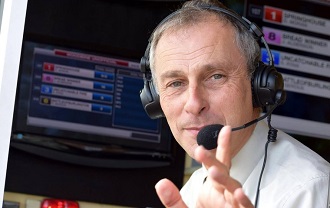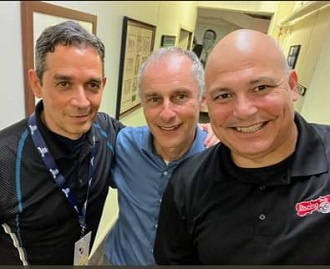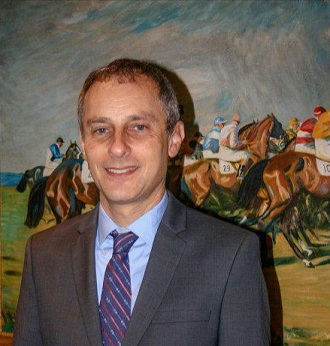|
Anécdotas
Hípicas Venezolanas presenta | ||
|
Entrevista a
Robert Geller | ||
|
Translated
into Spanish by Juan Luis Orta | ||
|
| ||
|
1- ¿Cuál
es tu nombre completo y cuándo y dónde
naciste? |
| |
|
1- What is your full name and when
and where were you born? | ||
|
| ||
|
Robert
Geller, 31 de
julio de 1959. Birmingham,
Inglaterra. | ||
|
Robert Geller, July 31, 1959.
Birmingham, England. | ||
|
| ||
|
2- ¿Cómo
entraste al deporte hípico? | ||
|
2- How did you get into the sport
of horse racing? | ||
|
| ||
|
Crecí
yendo a las carreras con mi familia en Melbourne virtualmente cada sábado
desde la tierna edad de cuatro años y me enamoré de este deporte. Mi
pasión por los caballos de carreras se intensificó y nunca se apagó. Yo
usaba mi tiempo libre de estudiante universitario para explorar como
llegar a ser un narrador de carreras. Yo escribí a los hipódromos por un
espacio donde yo pudiera estar con mi micrófono, grabadora y binoculares
para practicar. La oportunidad llegó entre diversas oportunidades, de aquí
y de allá, llevándome muchos años para poder establecerme con este trabajo
de buenos ingresos para mí y no como antes de medio tiempo. | ||
|
I grew up going to the races with
my family in Melbourne virtually every Saturday from the tender age of
four and loved it. My passion for horse racing raged on and never waned. I
used my spare time as a university student to explore becoming a racecaller. I
wrote to racetracks for a space where I could stand with my microphone,
tape recorder and binoculars to practice. Opportunity came in dribs and
drabs, a gig here and there, taking many years before being able to turn
part-time work into my main income. | ||
|
| ||
|
3-
¿Dónde y cuándo narraste tu primera carrera de
caballos? | ||
|
3- Where and when did you call
your first race? | ||
|
| ||
|
Aunque
había hecho pruebas de caballos arneses y practique narrando carreras de
purasangres de carreras, mi primera narración pública de carreras de
caballos ante el público fue en un picnic en el hipódromo en 1982 en el
Club de Carreras de Alexandra. Ese día yo estaba trabajando como vendedor
de apuestas. Un anuncio vino del altavoz preguntando si había alguien que
pudiese estar interesado en narrar las carreras, ya que su narrador no
había podido asistir. Dos de nosotros dimos un paso adelante y terminamos
alternando las narraciones.
| ||
|
Even though I had done harness
trials and practiced calling thoroughbred races, my first public call of a
race bet on by the public was at a picnic racetrack in 1982 at the
Alexandra Race Club. That day, I was working as a bookmaker's clerk. An
announcement came over the loudspeaker asking if there was anyone that
might be interested in calling the races since their racecaller
had failed to show up. Two of us stepped forward and we ended up
alternating races across the card. | ||
|
| ||
|
4-
¿Quién ha sido la persona más influyente en tu
carrera? | ||
|
4- Who was the most influential
person in your career? | ||
|
| ||
|
Mucho de
mi deseo por narrar carreras de caballos tiene su origen en haber crecido
escuchando al legendario narrador de carreras de Melbourne, Bill Collins
quien, una vez nuestros caminos se encuentran, fue mi un gran apoyo para
mí. |
| |
|
Joe Withee en
Emerald Downs fue un
instrumento en que me ayudó en la transición al hipismo norteamericano. No
solamente es Joe una
enciclopedia ambulante de carreras del Noroeste, él pudo hacerlo todo,
pasar de la radio a la televisión, medios, publicidad y handicaper.
Haber trabajado juntos por tantos años juntos, no tengo dudas que la ética
de trabajo increíble de Joe y su
profesionalismo consumado han sido buenas influencias. | ||
|
| ||
|
So much of my desire to call races
stemmed from having grown up listening to legendary Melbourne racecaller,
Bill Collins who, once our paths later met, was most supportive of me as
an up and comer. | ||
|
Joe Withee at
Emerald Downs was instrumental in helping me transition to North American
racing. Not only is Joe a walking encyclopedia of Northwest racing, he can
do it all, from radio to TV, media, publicity, MC and handicapping. To
have worked so closely together for so many years, I have no doubt that
Joe's incredible work ethic and consummate professionalism have been good
influences. | ||
|
| ||
|
5- ¿Qué
es lo que más disfrutas de narrar carreras y qué es lo más
difícil? | ||
|
5- What do you enjoy most about
calling a race and what is the most difficult? | ||
|
| ||
|
Me
encanta la manualidad de esto y nunca saber que voy a decir. El sentido
donde el poder real en la pista está como la carrera desenvuelta y
agarrando el inicio de un movimiento ganador antes esto es obvio, me da
una gran satisfacción. La parte más importante de narrar es mantener la
concentración. Mucho puede cambiar en una carrera en fracción de segundos.
Teniendo esto en mente, la parte más difícil que el momento te llevará
donde tú necesitas estar y sacarte de tu camino.
| ||
|
I love the craftsmanship of it and
never knowing what I am about to say. Sensing where the real power in the
field is as the race unfolds and catching the start of a winning move
before it is obvious, gives me great satisfaction. The most important part
of calling is maintaining concentration. A lot can change in a race in a
split second. With that in mind, the most difficult part is trusting that
the moment will take you to where you need to be and getting out of your
own way. | ||
|
| ||
|
| ||
|
| ||
|
6- ¿Cuál
es tu caballo favorito en una carrera que tu hayas narrado y la mejor
carrera que tu hayas narrado? | ||
|
6- Who is your favorite horse you
have called and the best race you have called? |
| |
|
| ||
|
Caballo
favorito: tuve la fortuna de narrar una carrera de Super Impose en el
circuito de campo Victorian
antes de convertirse en una súper estrella. Su larga e ilustre carrera en
Australia después incluyó una victoria en W.S. Cox Plate en
1992. Yo siempre he tenido afición por él. | ||
|
Un
caballo que he narrado mucho sería Wasserman, ganador de una
verdaderamente emocionante Milla Longacres
2008. Éste fue su segundo intento en la más prestigiosa carrera del
Noroeste del Pacífico. Un honesto y laborioso caballo en quien yo siempre
había creido desde
que era potro e hizo su campaña a los dos años. Wasserman estuvo ganando
dinero, aunque no ganara, pero hacía suya la temporada.
| ||
|
Mejor
carrera. La Copa de Oro de Hong Kong de 1990 ganada por Starlight.
Cuatro caballos estuvieron en una misma línea 200 metros con un Starlight de
quinto apartando al grupo.
| ||
|
Favorite horse: I had the good
fortune of calling Super Impose in a race on the Victorian country circuit
well before he became a superstar. His long and illustrious career in
Australia later included a win in the (1992) W.S. Cox Plate. I have always
had a soft spot for him. | ||
|
As far as a horse that I called a
lot, it would be Wasserman, winner of a truly thrilling 2008 Longacres
Mile. It was his second attempt in the Pacific Northwest's most
prestigious race. An honest, workmanlike horse who I had always believed
in since his 2YO campaign, Wasserman was always closing into the money yet
rarely winning but that season he really came into his
own. | ||
|
Best race: The 1990 Hong Kong Gold
Cup won by Starlight. Four horses were in a virtual line deep inside the
final 200 metres with a
fifth, Starlight, splitting the pack late. | ||
|
| ||
|
7- ¿Si
hay algo que pudieras cambiar de las carreras que
sería? | ||
|
7- If there is anything you could
change about horse racing, what would it be? | ||
|
| ||
|
Encuentro
curioso que en cada hipódromo que he trabajado lo más importante que
parece querer saber es la ganancia de las apuestas y todavía en mucha de
la cultura de las carreras, los fanáticos conocedores de apuestas pierdan
en la ganancia. Hay mucho énfasis en escoger ganadores, pero
muy poco en administrar el dinero. Siento que es un área en la cual hay
que poner mucha atención.
|
| |
|
I find it curious that at every
racetrack I have ever worked, the first thing management seems to want to
know is what the betting turnover is and yet in many racing cultures,
educating fans on how to bet, gets lost in the shuffle. There is a lot of
emphasis on picking winners but far less on how to wager wisely and of
money management. I feel this is an area that many fans struggle with that
warrants more attention. | ||
|
| ||
|
8- ¿Qué
podría sorprender a la gente de ti? | ||
|
8- What is something that would
surprise people about you? | ||
|
| ||
|
Odio los
exámenes de sangre. Esto probablemente tiene que ver cuando yo era joven y
la enfermera exclamó que se había perdido la aguja en mis venas y yo me
desmayé. He superado eso en estos momentos, pero por ratos me ataca la
fobia. | ||
|
I hate blood tests. It probably
goes back to when I was young and the nurse blurted out that she "lost"
the needle in my vein and I fainted. I am better with them these days but
phobias can haunt you your entire life. | ||
|
| ||
|
9- ¿Cuál
es tu hobby, deporte, comida, bebida, lugar, película, música, libro y
profesor favorito? | ||
|
9- What is your favorite: hobby,
sport, food, drink, place, movie, music, book and
teacher? | ||
|
| ||
|
Hobby:
me encanta explorar edificios históricos, aprender sobre su estilo
arquitectónico y disfrutar a los ojos sus bellos
muebles. |
| |
|
Deporte:
Como participante, corredor de larga distancia, como espectador, después
de las carreras el Fútbol Americano.
| ||
|
Comida.
Bagel con
queso crema y salmón con tomate jugoso, alcaparras, pepino fresco y
lechuga.
| ||
|
Bebida:
Café con crema filtrado al estilo cubano (pero no más de uno al
día) | ||
|
Película.
La Jaula de las Locas (1996) es una película que felizmente disfruto ver
una y otra vez. | ||
|
Música.
Los Bee Gees son
fenomenales. En todos los diferentes estilos amo Motown,
disco, rock, jazz y música clásica. | ||
|
Hobby: I love to explore historic
buildings, learn more about their architectural styles and feast my eyes
on exquisite furnishings. | ||
|
Sport: As a participant, long
distance running, as a spectator, after horse racing, NFL
football. | ||
|
Food: A lox and cream cheese bagel
with juicy tomatoes, capers, fresh cucumber and
lettuce. | ||
|
Drink: Cuban blend filtered coffee
with cream (but no more than one a day) | ||
|
Movie: Birdcage (1996) is the one
movie I can happily watch over and over again. | ||
|
Libro: Holding the Man (1995) de
Timothy Conigrave.
| ||
|
Bellamente
escrito, memorias elocuentes que hablan de mi
mundo. | ||
|
Profesor:
Séneca. Que tiempo tan fascinante en el imperio Romano. Un filósofo que
nos dejó mucha sabiduría. | ||
|
9-Music: The Bee Gees were
phenomenal. As far as music styles, I am all over the map. I love Motown,
disco, rock, jazz and classical. | ||
|
Book: Holding the Man (1995) by
Timothy Conigrave. A
beautifully written, eloquent memoir that speaks to my
world. | ||
|
Teacher: Seneca. What a
fascinating time to have been inside the Roman Empire. A philosophical
man, he left us with much wisdom. | ||
|
| ||
|
| ||
|
| ||
|
10-
¿Cuál sería tu mensaje final? | ||
|
10- What is your final message to
your readers? | ||
|
| ||
|
Profundamente
agradecido con mis compañeros y fanáticos quienes han y aun me apoyan en
mi viaje como narrador de carreras de caballos, especialmente aquellos que
he conocido en persona y han tocado mi
vida. | ||
|
I am deeply grateful to my peers
and race fans who have and continue to support me on my journey as a racecaller,
especially those I have come to know in person who have touched my
life. | ||
|
| ||
|
|
Autor: Prof. Juan Luis
Orta | |
|
e-mail:
[email protected] | ||
|
twitter:
@juanluisorta1 | ||
|
| ||
|
Anécdotas
Hípicas Venezolanas,
miércoles
12 de octubre de 2022 | ||
|
Copyright
2000, Anécdotas Hípicas Venezolanas C.A. Todos los
derechos reservados | ||





